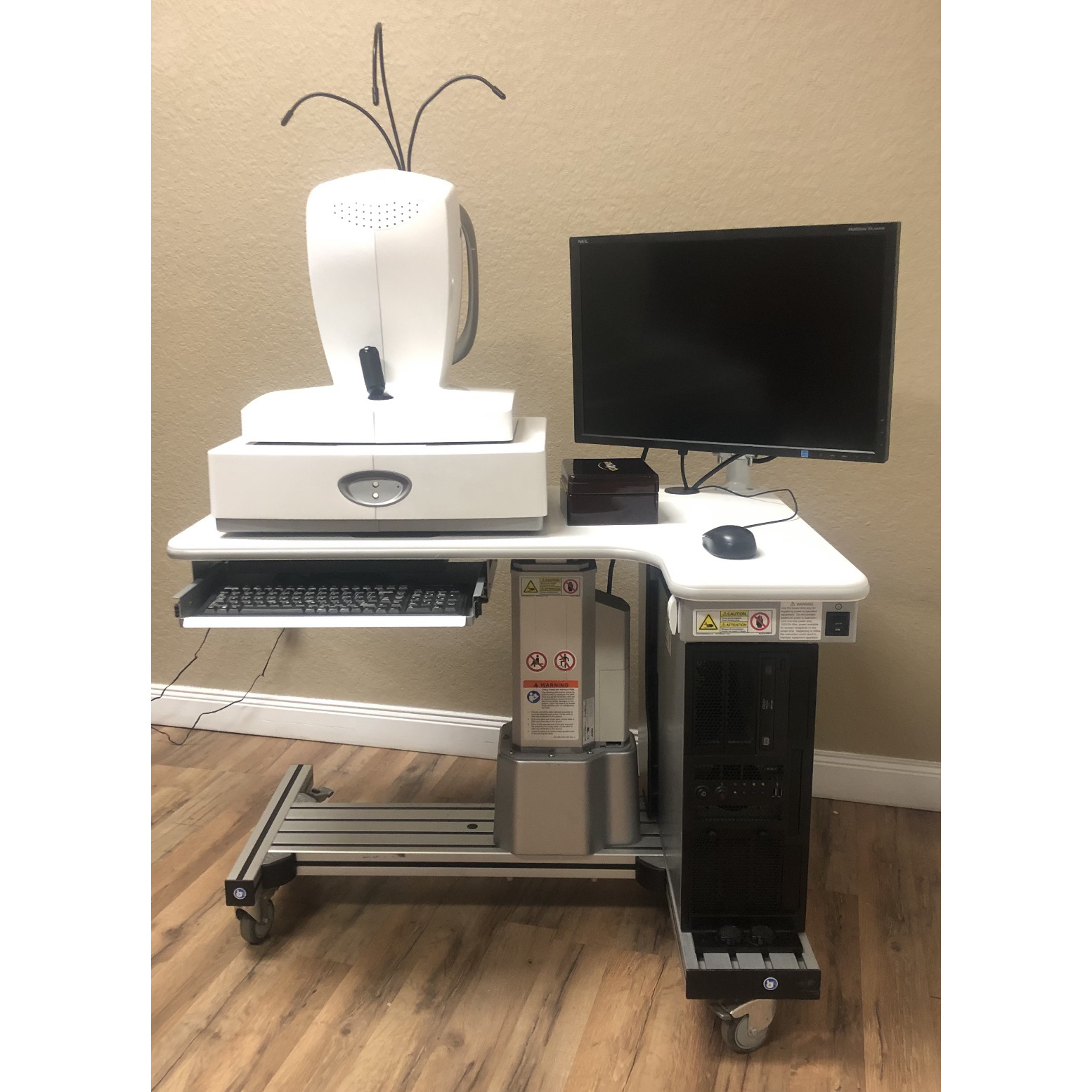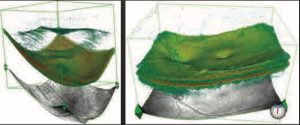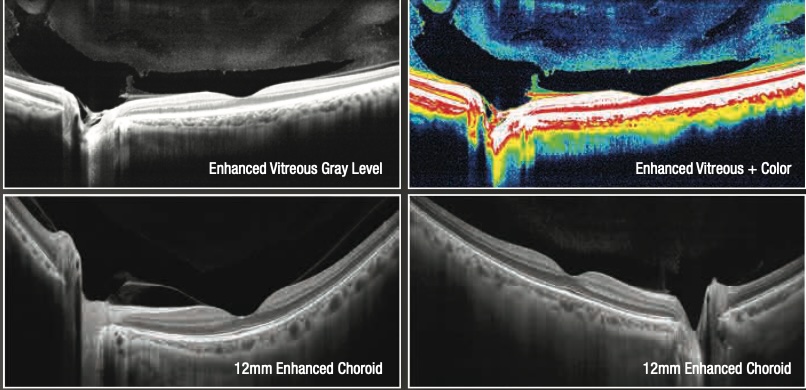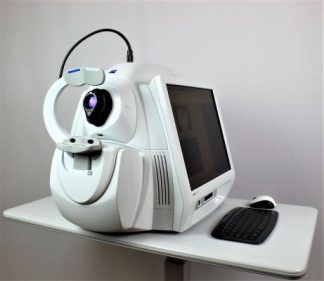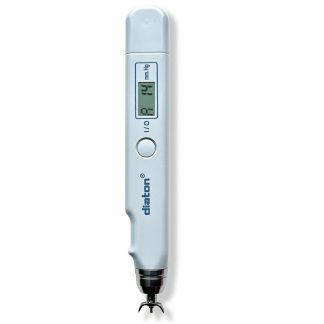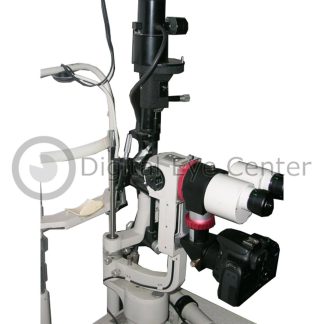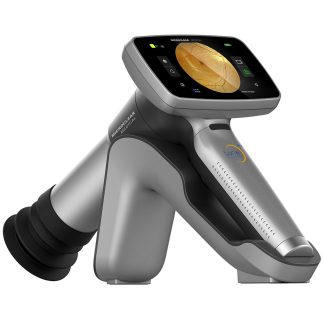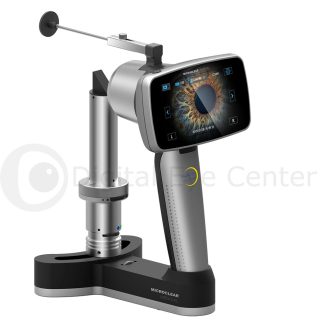Description
Optovue Avanti XR
The Avanti embodies many of the “Firsts” in SD-OCT development that Optovue has introduced to eye care, including the first FDA Cleared SD-OCT, 2-phase Noise Reduction, Mode switching to image the inner retina or the deep choroid, Choroid imaging and measurement, Anterior Segment imaging and measurement, GCC with FLV and GLV, Enface Analysis of 3D data, Pachymetry Mapping, Total Cornea Power measurement and more.
The refurbished Optovue Avanti xr OCT allows eye care practitioners at all levels to offer the most current technology and confidently stay ahead of clinical challenges. The Avanti’s forward-thinking development also provides clinicians with the basis to move to the next level in clinical OCT utility: functional OCT.
Avanti: The New Standard in OCT Imaging
- 70,000A-scans/second
- Widefield 3D OCT Imaging (12mm x 9mm)
- 320×320 3D cube
- 28μm B-scan spacing
- SMARTTM motion correction processing
- 3mm scanning window depth
- Enhanced HD Vitreous & Choroidal imaging
- SharpVueTM processing
- VTRAC Real-time tracking
- Deep Choroidal Imaging (DCI)
- Fovea Location Recognition (FLR)
- TREND analysis for Nerve Fiber & Central Macula
- Pachymetry map of the cornea (6mm)
- Total Cornea Power (TCP)
- Epithelium Thickness Map* (ETMTM) of the cornea (6mm)
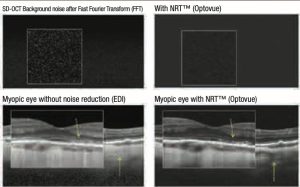
Motion Correction Technology applies proprietary algorithms to 3D data to reduce or remove artifacts caused by eye motion during scanning. 3D scans in OCT systems are the most time-consuming and prone to motion artifacts. SMARTTM MCT in Avanti allows a 3D cube of 320×320 (104 million data points) over a 12mm x 9mm area of the retina with little or no motion artifacts in most patients.
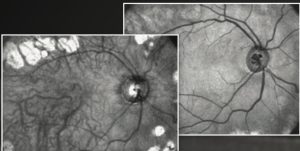
Widefield 3D with Smart Motion Correction Technology processing reduces the incidence of motion artifacts common in volume scanning. Correct alignment of data improves the likelihood of accurate and repeatable analysis.
Enface viewing of 3D data allows thin retina slices to be assessed for small micro-structural changes.
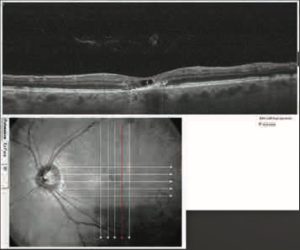
Widefield Enface Reference. A specifically segmented enface view of the 320×320 (28-micron spacing) OCT fundus image provides the highly detailed fundus enface reference view for all scan types for orientation and physiological correlation.
Real-Time Tracking. Avanti’s VTRAC active eye-tracking provides the detail and clarity you need to assess the retina, monitor your patients, and track disease progression.
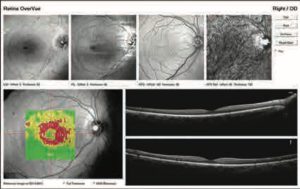
Retina Trend Analysis The new Retina Map Change Analysis report provides a Trend analysis of the Foveal Thickness and Macula Volume throughout the patient visit history.
Multi-layered Enface Report Presents a user-defined sampling of segmented slices in high contrast 2D enface summed images—user-selectable default for assessment of retina surface neuro-sensory, retina pigment epithelium, and choroid.
Comprehensive analysis tools for assessing changes in retinal nerve fiber, optic disc parameters, and ganglion cell complex structures over time.
Retinal Nerve Fiber (RNFL) and Optic Disc.
Optovue’s robust proprietary algorithms allow for the confident assessment of the optic nerve head and Retinal Nerve Fiber. For the RNFL sampling and optic disc parameters, a comparison to an extensive normative database is provided.
A Normative Database (NDB) comparison reference is provided for the Retinal Nerve Fiber Layer, Optic Disc, and GCC (Ganglion Cell Complex), including FLV (Focal Loss Volume) and GLV (Global Loss Volume).
Ganglion Cell Complex (GCC).
GCC Analysis was introduced to eye care by Optovue in 2007. Seven years of clinical studies have shown Optovue to be the leader in developing and expanding the clinical utility of OCT technology.
Focal Loss Volume (FLV) & Global Loss Volume (GLV) are exclusive and proprietary analyses that increase the specificity and sensitivity of the GCC analysis.
Combined RNFL / GCC Change Report + TREND
The nerve fiber change summary report, with the new TREND analysis, provides the most comprehensive data presentation to simplify your evaluation process.
Proprietary algorithms determine the optic disc margin and vessel patterns to ensure reliable RNFL and optic disc change over time assessment.
TREND Analysis assesses the rate of change for Retinal Nerve Fiber and Ganglion Cell Complex structure.
- No highlighting of p-value indicates no statistically significant change over time.
- Light purple with black numbers indicates that the change over time is borderline statistically significant.
- Dark purple with white numbers indicates that change over time is statistically significant.
The NDB Comparison summary table quickly references metrics flagged as borderline or outside normal limits.
Optic Disc Structure Analysis
High-detail structural examination of the optic disc with Cross line B-scans
Widefield Enface Mapping
Convenient and quicker assessment of orientation with RNFL and GCC results mapped to widefield enface.
TCP®: Total Cornea Power
TCP®:TotalCorneaPower enhances post-refractive IOL calculations for greater confidence in surgical outcomes.
The Cornea Power Upgrade allows the evaluation of patients with prior refractive procedures. Standard topography only calculates the front curvature and then extrapolates posterior curvature. Using the Cornea Power Upgrade option, the anterior and posterior curvatures are measured directly to obtain cornea powers.
Technical Specifications Optovue iVue OCT
| OCT Camera: | 70,000 A-Scan / Second |
| Optical Resolution: (in tissue) | Axial Resolution: 5 um Transverse: 15 um |
| Image Sampling Rate: | Axial Resolution: 3 um Digital |
| Scan Range: | A-Scan Depth: ~3 mm Transverse: 2 mm to 12 mm |
| Scan Beam Wavelength: |
λ = 840 nm |
| Exposure Power at Pupil: | 750 uW maximum |
| Patient Interface: | Working Distance: 22mm Motorized Focus Range: -15D to + 20D |
| Computer | CPU: i7, 3.2 Hz, Windows 7 64 bit RAM: 16 GB Hard Disk: 2 TB |

